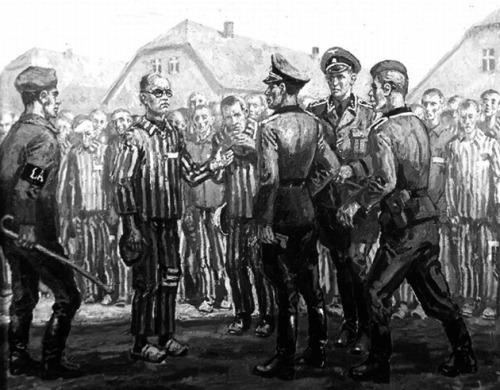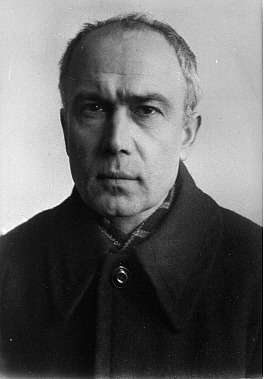St. Maximilian Maria KolbeOn the day 29th of July, 1941, during roll-call, one prisoner was missing
St. Maximilian Maria KolbeOn the day 29th of July, 1941, during roll-call, one prisoner was missing from Father Kolbe’s barrack. The roll-call lasted the entire day, despite the July heat, with no food or drink. In the evening, the camp commander Fritzsch declared his will – ten prisoners would be condemned to death in the chamber of starvation for the one escapee. When the selection of the ten prisoners was finalized, last one of them [named Franciszek Gajowniczek] said: „My poor wife and children!” Father Kolbe, who was standing near, heard those words. He stepped out of ranks and while guards were screaming at him, asked to speak to the camp commander. Then, the unthinkable happened – guards lowered their weapons and retreated. Father Kolbe approached Fritzsch. Fritzsch reached for his gun and yelled: „Stop! What is the meaning of this?” That did not frighten Father Kolbe as he stood in front of Fritzsch. The camp commander, clearly shocked and surprised by this behavior, said:“What does this Polish pig want?”Father Kolbe calmly replied in German: “I wish to die instead of one of these prisoners.”“For which one?” - asked Fritzsch. Again the unthinkable happened, as the master of life and death engaged in a dialogue with a prisoner who for him represented a subhuman, “number 16670.” “Who are you?” – he asked.“I am a Polish Catholic priest” „I’m nearly 50 years old, I have lived my life, but he is young. He has a wife and children, they need him. Let him live, I will go for him”.Fritzsch was still shocked: „Why would you die for a stranger?”„I want to give them courage to live”. [x]A man who was saved, Franciszek Gajowniczek, recalled later that moment: „I couldn’t do anything, nor say ‘Thank you’ - we just looked at each other and then he went to go. He was taken, and I came back to barrack. It took me a long time to truly process what had happened.” [x]Ten chosen prisoners were stripped of the camp rags and were led naked to cell number 18, in the basement of block 11, a room measuring only 2.5 by 2.5 meters. They were locked there to die of hunger.Bruno Borowiec, who worked as a translator in block 11, recalled: „[During his time in the cell] Father Kolbe never complained. He prayed aloud so his inmates would hear him and could join him. From the cell, where those poor men were, everyday we could hear loud prayers, rosary and singing, to which prisoners from other cells would join too. He knew how to console people. His inmates would curse and scream in despair, but after he spoke to them, they would calm. […] Even the SS knew he has been an exceptional man.” [x]After two weeks, on August 14, 1941, Father Kolbe and three other companions were still alive. Because the cell was needed for other purposes, the prisoners were finished off with a phenol injection delivered by the camp nurse a criminal named Bock. Upon seeing the approaching executioner, Father Maksymilian stretched out his hand willingly to receive the lethal injection. At that moment he most certainly saw the Immaculate who was holding two crowns in her hands, one red and one white, and who spoke in a gentle voice heard in the entire camp, Poland, Germany, Europe and the world: „Come faithful servant, both crowns are yours”. His body was cremated the following day, August 15 – the feast of the Assumption of the Blessed Virgin Mary.Source: www.pmk-sa.com / niezlomni.com / www.polskieradio.plPictures:1. st. Maximilian offering himself in place of his “brother” (x)2. St. Maximilian, 1939. (x)3. Cell no. 18 in block 11, Auschwitz, where st. Maximilian died. In the corner iron wreath marks the place his body was. Large candle was placed there by pope st. John Paul II during his visit in 1979. (x) -- source link
Tumblr Blog : weirdpolis.tumblr.com
#saints#wwii


